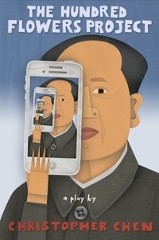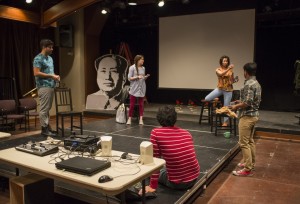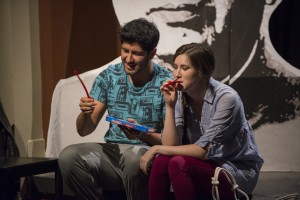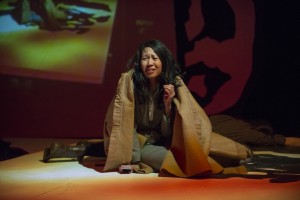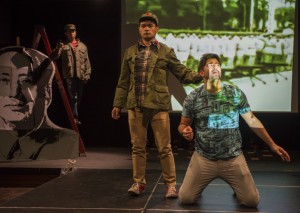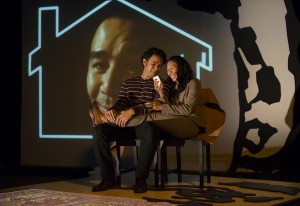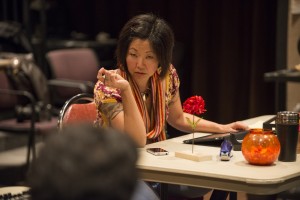FACELESS FOLLOWERS OF TWITTER AND MAO
There’s a fascinating paradigm shift in the middle of The Hundred Flowers Project, Christopher Chen’s cautionary stage and video thriller. Whether you can believe it or not, the first-act rehearsal of a play about Mao Tse Tung’s propagandistic “Hundred Flowers Project,” “Great Leap Forward,” and Cultural Revolution becomes, in the second act, the sole reality—a self-sustaining play that unleashes its lethal agenda like the computer Hal in 2001.
Kinetically enacted by Silk Road Rising in a bold staging by Joanie Schultz, Chen’s ambitious two-act puzzle/protest play conflates two instruments of “persuasion.” Contrasted—but mostly compared—are the Chinese Communists’ bombardment of a cowed populace with false hopes, empty promises and not so empty threats—and our conformity-minded, socially-shaming social media, whose sometimes pernicious influence often masquerades as self-expression and free speech.
The drama begins innocuously enough, with six young actors in a Chicago rehearsal studio. Somewhat pretentiously, they spew out concepts like “Zeitgeist” and “reflection of the masses” as they thrash out the structure and content for a play about Mao and his manipulation of the masses. Will it be narrative or pastiche? legends or anecdotes? digital media or barebones theater? Sardonically, they call their process a “congealing” of ideas, even as a few question the fundamentals of the creative process as shaped by their increasingly autocratic leader Mel (Mia Park).
Their play, “The Hundred Flowers Project,” (named after Mao’s deceptive encouragement of dissent, conveniently followed by a crackdown) purports to confront the media machinations of the author of The Little Red Book. It wants to give a human face to the turbulence that erupted as the tyrant and his cadres promoted and prosecuted his disastrous economic and social policies from 1958 to 1976. (Ill-considered rural steel factories led to scarcities and spread famine across the land; pestilence, persecution, and paranoia were passed off as the price of progress.)
Mao sought to instill a fear-ridden mindset of “continuous revolution.” The one reality was “only beginnings”—an “endless, shifting present” where the party line may change from day to day but is ever and always infallible. “Thought crimes” change to suit the state, so mindless obedience becomes its own survival strategy.
Slowly technology imitates history and the actors’ love lives and losses get sucked into the all-powerful Project. Until in the second act the play is quite literally the thing, devouring the actors (including Karmann Bajuyo, Kroydell Galima, Joseph Sultani, and Hannah Toriumi) and one hapless journalist (Melissa Canciller) in its unstoppable dialectic. Their actions are now transformed into “legends,” reducing them to binary pixels but also demanding human sacrifice. Whose story is this? Has the tale become the teller?
It’s the same deceptive façade pioneered in films like The Game, The Truman Show, Pleasantville and, most of all, The Matrix. (The Communist analogy aside, this play owes a lot to these avatars.) Chen’s attempt to expose Facebook, Twitter, and Google as successors to Mao’s public relations campaigns might seem forced and fearful. But the literally detonating second act (sound designer Peter Storms lives up to his name) traps us as much as the project’s personnel.
It’s an interesting experiment, as reflective of the all-present Web as it is of the past-loathing Cultural Revolution. You might even call it a brainy Blair Witch Project. These equivalencies may feel exaggerated for effect but it’s scary stuff while it happens, immensely aided by Michael Stanfill’s stark and supple video and projections.
Viewed a day later, however, The Hundred Flowers Project may seem an exercise in extremism, carried away by its own self-fulfilling analogies. No question, though, this is definitely a play for anyone who loves the term “meta,” possibly the four most abused letters in theater today.
The Hundred Flowers Project
Silk Road Rising
Pierce Hall
The Historic Chicago Temple Building
77 W. Washington St.
Thurs at 7:30; Fri and Sat at 8; Sun at 4
scheduled to end on November 23, 2014
for tickets, call 312.857.1234 x 201
or visit www.silkroadrising.org
for more info on Chicago Theater,
visit www.TheatreinChicago.com
